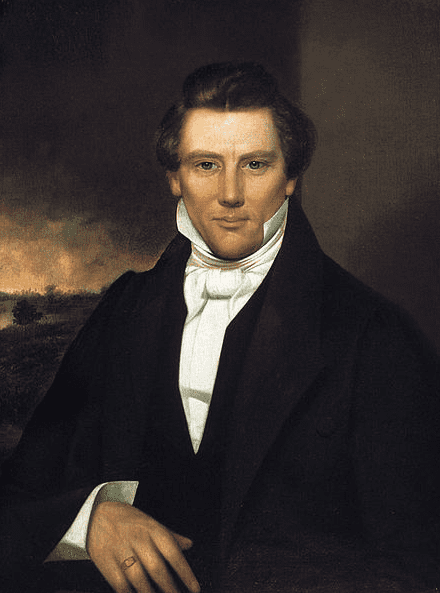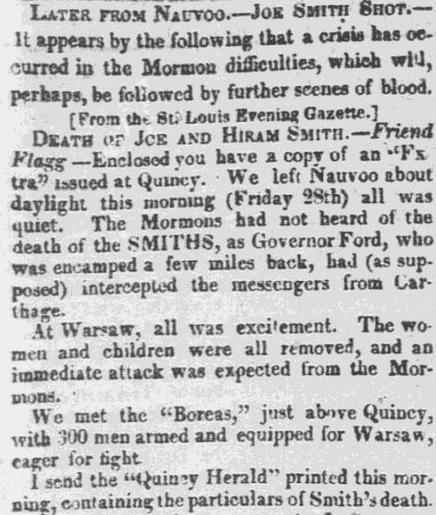Before Brigham Young led them to establish a safe community in Utah’s Salt Lake Valley in 1847, the Mormons, members of The Church of Jesus Christ of Latter-day Saints (LDS), had uneasy relations with their neighbors everywhere they tried to settle. They established their own community in Nauvoo, Illinois, in 1839 after being persecuted in Ohio and Missouri for their religious beliefs.
They were again subjected to persecution by their new neighbors in Illinois, and their leader, Joseph Smith, Jr., was assassinated by an angry crowd on 27 June 1844 inside the Carthage Jail in Illinois, where Joseph and his brother Hyrum were being held on charges of treason.

The following newspaper article provides details of Smith’s murder, and reveals the fear and mistrust between Nauvoo and its surrounding communities.

Here is a transcription of this article:
Later from Nauvoo
Joe Smith Shot
It appears by the following that a crisis has occurred in the Mormon difficulties, which will, perhaps, be followed by further scenes of blood.
(From the St. Louis Evening Gazette.)
Death of Joe and Hiram Smith
Friend Flagg,
Enclosed you have a copy of an “Extra” issued at Quincy. We left Nauvoo about daylight this morning (Friday 28th); all was quiet. The Mormons had not heard of the death of the Smiths, as Governor Ford, who was encamped a few miles back, had (as supposed) intercepted the messengers from Carthage.
At Warsaw, all was excitement. The women and children were all removed, and an immediate attack was expected from the Mormons.
We met the Boreas, just above Quincy, with 300 men armed and equipped for Warsaw, eager for fight.
I send the “Quincy Herald” printed this morning, containing the particulars of Smith’s death.
In haste, yours, &c.
A. J. Stone
On board steamboat St. Croix, Friday evening, June 28, 1844
(From the Quincy Herald, Friday, 3 o’clock A.M.)
Death of the Prophet!!
Joe and Hiram Smith Are Dead!!
The steamboat Boreas just in from Warsaw, brings shocking intelligence from the scene of the Mormon war. The following slip from the office of the “Warsaw Signal” explains the dreadful tragedy:
“Joe and Hiram Smith are dead – shot this afternoon. An attack from the Mormons is expected every hour. Will not the surrounding counties rush instantly to our rescue?
Warsaw, June 27, 1844.”
It seems that the circumstances attending the killing of the Mormon Prophet and his brother Hiram are as follows: On yesterday Gov. Ford left Carthage with about 120 soldiers for the purpose of taking possession of the “Nauvoo Legion” and their arms. They arrived at Nauvoo about noon, and called for the assembling of the Legion.
About two thousand men with arms immediately responded to its call. These troops were put under command of Col. Singleton, of Brown county, who accompanied Gov. Ford to Nauvoo.
The Governor finding all quiet left Nauvoo about 5 o’clock P.M., with a company of 60 men for the purpose of encamping about seven miles from the city.
At about the same time that Governor Ford left Nauvoo, the Prophet and his brother were killed at Carthage, under the following circumstances, as near as we can ascertain them:
Joe and Hiram are both confined in the debtor’s room of the Carthage jail, awaiting their trial on a charge of treason. The jail was strongly guarded by soldiers and anti-Mormons, who had been placed there by the Governor.
A Mormon attempted to rush by the guard for the purpose of forcing his way into the jail. He was opposed by the guard, and fired a pistol at one of the guard, giving him a slight wound.
A general confusion ensued in the crowd around the jail. Joe and his Mormon fellow prisoners it seems had provided themselves with pistols, and commenced firing upon the guard within. He then attempted to escape from the window, when a hundred balls entered his body, and he fell a lifeless corpse.
His brother Hiram shared the same fate. Richards, a leading Mormon, was badly wounded. There our intelligence ends – what took place after this, God only knows. Mormons immediately left for Nauvoo to carry the news of the death of the Prophet. It is feared that the Mormons at Nauvoo will be so exasperated as to exterminate the Governor and his small force.
The Boreas brought down most of the women and children from Warsaw. It is feared their town is in ashes before this.
Our citizens were aroused this morning by the ringing of bells and a call to arms. Our three independent companies are already in marching order. Maj. Flood has ordered out the militia of this regiment, and the steamer Boreas is waiting to convey them to the scene of action.
There is no knowing where this dreadful affair will end. Many have expressed fears that our city is in danger, because most of the Warsaw families have taken refuge here – but we believe there is no danger; we are too far from the scene of action.
Messengers have just left for Hannibal and the towns below for the purpose of arousing the Missourians. The excitement in our city is intense, and the anxiety to hear the fate of Gov. Ford and his men is very great.
Since the above was in type we received by last evening’s mail St. Louis papers to the 28th ult., which go to confirm the main facts. The following, from the “St. Louis Gazette,” gives the particulars of the death of Smith:
Steamer Boreas, June 27, 11½ P.M.
Joseph Smith the Mormon prophet is dead! He was making laudable efforts to avoid or escape from certain unbidden guests, and to this end precipitated himself from a window in the second story of the Carthage jail. During the few seconds of his descent, and immediately thereafter, he received as many as fifteen wounds, many of which were mortal. Yesterday, the 26th, Governor Ford having prevailed upon Joseph Smith and several other principal Mormons, to resign themselves into the hands of the officers of justice at Carthage to be tried by due process of law, five, and I believe only five, viz: Joseph and Hiram Smith, a Doctor Richards, and two others were incarcerated in the Hancock county jail, and guarded by the Governor’s troops, until this morning, when Governor Ford discharged the troops, except sixty already stationed at Nauvoo, and a further reserve of sixty, who, today, accompanied him to Nauvoo, to detect and annihilate the bogus factory, leaving the prisoners in the safe and efficient keeping of seven men of the Carthage Greys. Shortly after disbanding the McDonaugh troops, and the Governor’s departure for Nauvoo, a large body of militia, say two hundred, resolved to wait on the prisoners in their room. Here was the beginning of trouble.
The faithful Greys could not consistently admit visitors to prisoners accused of treason and other felonies. The militia took efficient means to convince the guard of their impotence, and the opposing forces joined issue. The door was forced, and Joe shot the foremost, named Wills, through the wrist. A general melee ensued, in which pistols spoke eloquently and forcibly. Five of the militia were wounded, though slightly. Joe Smith, endeavoring to escape, precipitated himself from the window, receiving while between heaven and earth some half dozen shots, and five thereafter. Hiram, I am told, and three others were killed within the prison. This tragedy was enacted between the hours of four and five this afternoon, and I heard the announcement of the courier to Warsaw at eight. The men immediately fell in, shouldered arms, right faced, and made diverse defensive preparations; whilst the women, with children in arms, throng the levee to cross by moonlight to Missouri, to await the return of the Boreas from Koekuk to Quincy, that they may not be endangered should the desperate Danites attempt to revenge the loss of their defunct head. All is confusion, and Warsaw appears as if besieged.
The “Louisville Journal” of the 3d inst. says:
We have seen a gentleman who was in Nauvoo on Friday, and who informs us that all was then quiet there, the prominent Mormons exhorting their followers to offer no insult or molestation to anyone, and in no case to offer violence except in strict self-defence. The deepest grief and affliction pervaded the city. There appeared to be no danger of the burning of Warsaw or Carthage.
Note: An online collection of newspapers, such as GenealogyBank’s Historical Newspaper Archives, is not only a great way to learn about the lives of your ancestors – the old newspaper articles also help you understand American history and the times your ancestors lived in, and the news they talked about and read in their local papers.
